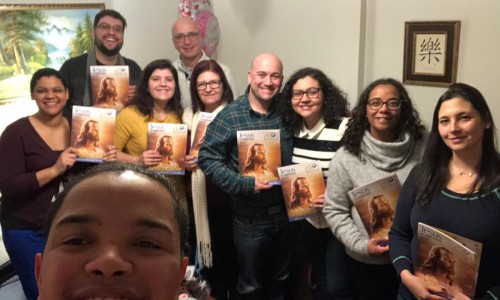Alziro Zarur and Paiva Netto: The Awakening of Two Missionaries
The Founding Leaders of the Good Will Organizations.
A friendship of Goodwill that was blessed by Jesus for almost a quarter of a century!
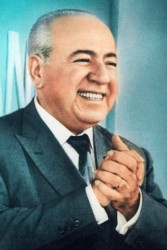
Alziro Zarur (1914-1979)
A day of peace in a year of war. This was how Jesus’ Christmas was celebrated in 1914 when nations were battling each other during World War I. On that day, Alziro Abraão Elias Davi Zarur, the son of Ássima and Elias Zarur, was born in Rio de Janeiro, Brazil.
His mission on Earth was remarkably revealed to him at the age of 12 when he had a vision of Jesus, the Christ of God. In it, Jesus entrusted him with the earthly task of communicating to the peoples His New Commandment, which He, as the Son of God, had brought to this planet two thousand years ago—but that had been forgotten in the Holy Bible. In the Gospel according to John 13:34 and 35, Jesus said:
“Love one another, as I have loved you. Only by this shall all of you be recognized as my disciples, if you have the same Love for one another.”
Alziro Zarur was just 15 years old when he started working in the communications field. He later became a journalist and wrote for the main newspapers of that time. He also became a radio broadcaster, poet, and writer. In 1976, he reached the impressive mark of 33,000 programs aired on the radio. On January 6, 1948, another spiritual order would complement the one he had received from Jesus when he was a child.
In a meeting in the Brazilian Spiritist Federation (FEB) in Rio de Janeiro, a highly respected medium, the late Sister Emília Ribeiro de Mello, described that she saw Saint Francis of Assisi standing next to Zarur the entire time, and that he had asked her to pass on a message to Zarur: “It’s time to start.”
This event would turn him into a social activist and a great preacher of the Word of God. On March 4, 1949, to the surprise of those who followed him, he gave up his successful career and launched the radio program Good Will Hour, dedicating himself to preaching the Holy Bible, especially the Gospel and Apocalypse of Jesus.
On January 1, 1950, Zarur gave material form to the Love that Jesus had revealed to him: he founded the Legion of Good Will (LGW), on the date known as the World Peace and Universal Brotherhood Day.
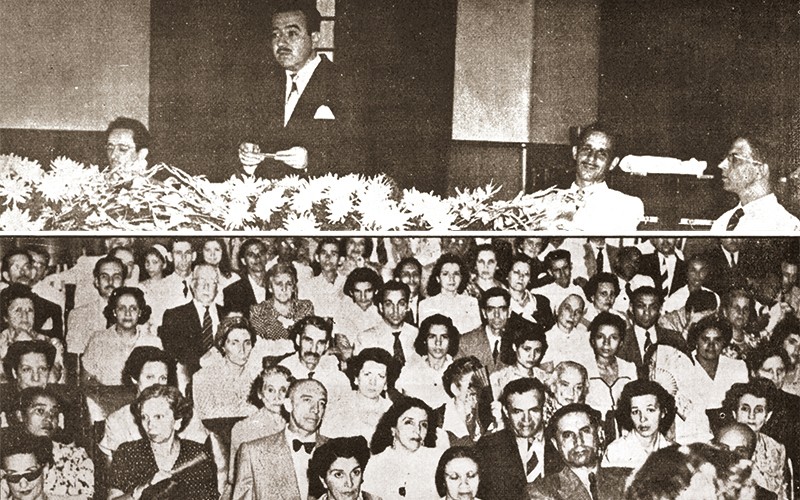
Zarur initiated a positive renewal of concepts, and it became evident when he created and presided over the pioneering Crusade of Brotherly Religions, the first edition of which officially took place on January 7, 1950, in the boardroom of the Brazilian Press Association (ABI) in Rio de Janeiro, after successive preparatory meetings that had been held in October, November, and December 1949.
Representatives of various religious and philosophical traditions met under the leadership of Zarur in the main auditorium of ABI. The speakers were: Reverend Salustiano César, a Protestant; Teles da Cruz, a Catholic; Murilo Botelho, an Esoteric; Leopoldo Machado, a Spiritist; Eugênio Figueiredo, a free thinker; Samuel Linderman, a Jew; and Ascânio de Farias, a Positivist.
Zarur’s brilliant accomplishment was widely reported in the press and was the precursor of what was later called an inter-religious relationship. The initiative was acknowledged by Pope Paul VI (1897-1978), who, through the Apostolic Nuncio of Brazil, Dom Sebastião Baggio (1913-1993), presented Alziro Zarur with a medal “for his services to the cause of Ecumenism.”
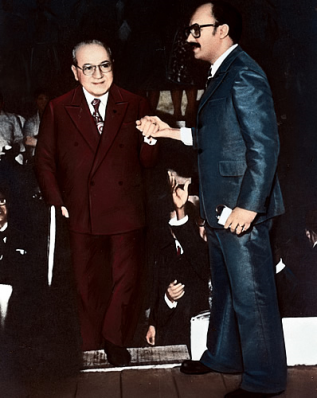
Also in the late 1940s, Zarur began to distribute the popular “Soup for the Poor,” which provided care for vulnerable people by offering them food, hygiene treatment, health care, and collective prayers. This initiative was the forerunner of the Charity Round program that was created in 1962, an altruistic service provided by the LGW in its permanent campaign against the hunger of the body and Soul.
The essence of these activities was the proposal that people should experience an atmosphere of Ecumenical Fraternity every day of the year, as is suggested by December 25 in Christian traditions.
In a bold marketing move, he established and propagated the “Permanent Christmas of Jesus” and chose the traditional Christmas song Silent Night by Franz Grüber (1787-1863) and Joseph Möhr (1792-1848), to spread the idea on the radio, even when it is not the holiday season.
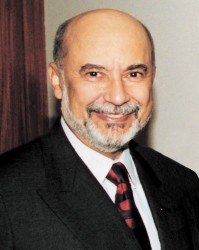
This brave strategy touched the hearts of many, especially that of a 15-year-old, who heard it on the radio and carefully listened to Zarur as he read the Bible passage in which the Apostle Luke narrates the Angels’ praise and happy announcement of the birth of the Savior of the world to the shepherds living out in the fields: “Glory to God in the highest and Peace on Earth to people of Good Will” (The Gospel according to Luke 2:14).
The young man was deeply moved by this and said to his beloved mother, Idalina Cecília de Paiva (1913-1994), in a decisive way: “Mother, it is him who I will follow!”
The heart of José Simões de Paiva Netto had been touched, and this started his journey at the LGW. From this moment on, he became a volunteer at the Organization.
The Journey of a Man of Good Will
Around a year later, Paiva Netto realized it was time to meet the man who had inspired him to pursue the cause of God’s Good Will (The Gospel according to Luke 2:14) and of the New Commandment of Jesus (Good News according to John 13 and 15).
With determination, he took with him his beloved sister, Lícia Margarida, and, at night, they went to the Lins de Vasconcelos neighborhood in Rio de Janeiro on June 28, 1957, where after much insistence he persuaded the door attendant to announce his presence to the creator of the LGW, who lived there. On receiving him, Zarur exclaimed:
“What took you so long to come here, boy?! I’ve been waiting for you for a very long time!”
Two Souls committed to Jesus were together again.
The reality of Eternal Life has always been an important topic in Alziro Zarur’s preaching. Being fully convinced that our Spirit survives after the phenomenon of death, Paiva Netto continued with and expanded the work started by Zarur when he returned to the Spiritual World on October 21, 1979.
The next day, standing alongside the tomb of the late Founder of the LGW, before a large crowd of Legionnaires of Good Will and people in general, he said in a strong voice, as soon as the tombstone was put in place: “Alziro Zarur’s body is lying here in this tomb, but his Spirit is in the Legion of Good Will. Let’s go there!!!”
The crowd then responded vigorously and emotionally: “Let’s go!!!” And they all left firmly and renewed to continue with the apostolate in the Organization. For nearly a quarter of a century the journalist, radio broadcaster, and writer José de Paiva Netto was one of Zarur’s chief advisers, having been officially appointed by Alziro Zarur as the Secretary General of the Legion of Good Will (a position equivalent to that of vice-president).
With the death of the LGW’s founder, he succeeded him and made the Organization grow tremendously, which is a trait of his faithful, practical, and achieving spirit.
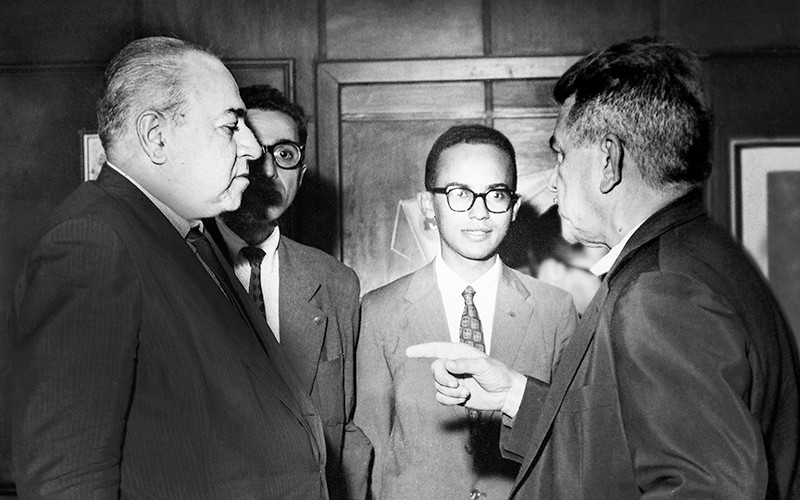
Committed to Jesus
Zarur did not live long enough to turn all of his ideals into a reality. It was up to his faithful successor, Paiva Netto, to further develop the pioneering, spiritual doctrine of the Religion of the Third Millennium, to successfully carry out and accomplish the Legionnaire Mission in Brazil and abroad, to foster the New Commandment of Jesus in the hearts and minds of people, and to guide children, young people, adults, and the elderly.
On October 1, 1982, José de Paiva Netto started the process of having the Divine Religion officially recognized. He registered it as a legal entity on December 19, 1983, in the Civil Registry Office of Legal Entities in Rio de Janeiro. He turned the Proclamation made by the late Brother Alziro Zarur on October 7, 1973, in Maringá into a reality.
Today, the Religion of God, of the Christ, and of the Holy Spirit is based in Brazil, Argentina, Bolivia, Paraguay, Portugal, the United States, and Uruguay and has countless followers across the world. This journey dedicated to the development of human beings and their Eternal Spirit dates from the first visible visit of Jesus to planet Earth, especially when the Heavenly Educator brought us His New Commandment, which is the foundation stone of the Religion of the Third Millennium.
By doing so, the Master of masters indicated the path of salvation. He exemplified His infinite capacity for loving us as much as the Heavenly Father, the Creator of the Universe, loves Him. That is why the Divine Religion is also known as the Religion of Universal Love, because it is based on the New Commandment that was left by Jesus, but had been forgotten by Humanity until September 7, 1959, when Zarur proclaimed it in the city of Campinas.
This Law of Universal Fraternity is the basis of the work of the Religion of God, of the Christ, and of the Holy Spirit and the reason why it exists. Because it advocates for Peace and Complete Charity—helping the needs of the body and, above all, of the Soul—the Religion of the Third Millennium preaches the Four Pillars of Ecumenism in a pioneering way.
It is neutral ground for “unifying all spiritual and human knowledge in a powerful force in the service of the people,” as Paiva Netto defines it. Therefore, it stands side by side with all religious and philosophical traditions and groups that dedicate themselves to human beings in their search for God and for experiencing His teachings. Its task is mainly that of support and spiritual understanding, in which the examples of Jesus registered in His Gospel and Apocalypse are at the core of all preachings.
The Ecumenical and therefore universal Christ Himself, the Divine Statesman, presents Himself as the Great Ideal on Earth to be lived by all creatures who long for society to be transformed for the better. “The Religion of the Third Millennium was not born to come into conflict with any religion or philosophy. It was founded in order to sow Fraternal Love among spiritual and earthly creatures,” explains the leader of the Divine Religion.
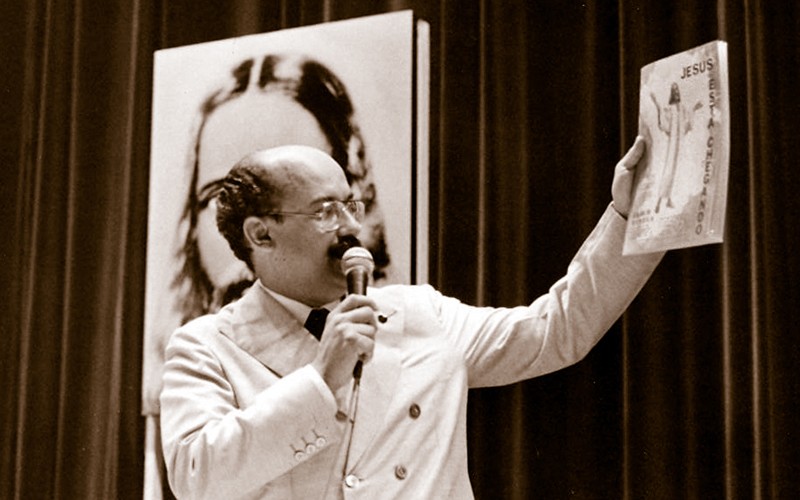
On February 27, 1982, in the prestigious Grand Assembly of the LGW in Campinas, he launched the first issue of JESUS ESTÁ CHEGANDO! [JESUS IS ARRIVING!], which is the ecumenical magazine of the Religion of Universal Love. Paiva Netto transferred the LGW’s headquarters from Rio de Janeiro to São Paulo on September 7, 1984.
Under his command, the LGW expanded and built several social and educational centers, including schools (providing basic education as well as night classes for young people and adults), homes for the elderly, and social service centers, which offer training courses for thousands of adolescents and adults who come from poor communities throughout Brazil.
The LGW successfully applies its revolutionary teaching line, created by educator Paiva Netto: the Pedagogy of Affection (aimed at children up to 10 years old) and the Ecumenical Citizen Pedagogy (from the age of 11 onwards), which educate both brain and heart. In 2017, the Organization provided more than 13.5 million services and benefits to the population at social risk in Brazil, which is an impressive figure!
The Good Will Ideal also inspires the success of the LGW of Argentina, Bolivia, Paraguay, Portugal, the United States, and Uruguay, where activities are maintained thanks to the donations of the local population.
In terms of social communication, Paiva Netto launched the Good Will Program on June 1, 1983, which is broadcast until today on various TV networks throughout Brazil. He is responsible for having set up the Elevação Publishing House, the Good Will Printing House, the Som Puro recording studios, the Good Will web portal (www.boavontade.com), the Super Good Will Radio Network, and the Boa Vontade TV.
He wrote several literary works, with more than 7.5 million copies sold. His books have been translated into dozens of languages.
Under the administration of Paiva Netto, the Legion of Good Will was the first civil society organization in Brazil to become a member of the United Nations Department of Public Information (DPI), in 1994. In 1999, the LGW was also the first Brazilian non-governmental organization to obtain general consultative status with the UN Economic and Social Council (ECOSOC).
In 2000, it became part of the Conference of NGOs in Consultative Relationship with the United Nations (CoNGO), whose headquarters are in Vienna, Austria.
Temple of Good Will
The moment Paiva Netto took over the Legion of Good Will was mystically observed by a great friend of the two missionaries, the famous Brazilian Protestant pastor Jonas Rezende (1935-2017):
“When Alziro Zarur left us, any concern that people might have had was suddenly dissipated, because a figure of great moral and spiritual worth, as Paiva Netto is, took his place. And so the LGW did not suffer any issue of continuity. One leader did his part and the other raised the flag and did not drop it. It’s like what happened to Moses and Joshua: one ends and the other continues. It’s difficult for us to make comparisons because each one has their value and each one has their own historical moment.”
Paiva Netto conceived, built, and founded the Temple of Good Will (TGW) in Brasília, the capital of Brazil, on October 21, 1989. This had been a lifelong dream of Alziro Zarur, and on the 10th anniversary of his return to the Spiritual World the monument was inaugurated. Alongside the Temple of Peace, Paiva Netto also founded the World Parliament of Ecumenical Fraternity, the LGW’s ParlaMundi (inaugurated on December 25, 1994).
The success of the Ecumenical Complex of the Legion of Good Will is identified by the Secretariat of Sports, Tourism, and Leisure of the Federal District (SETUL-DF), which monitors sightseeing to the various monuments in the country’s capital.
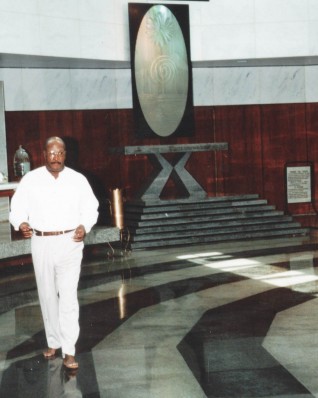
The TGW has been the most visited place in Brasília for almost three decades, receiving annually more than 1 million pilgrims. They have created in the rooms dedicated to prayer and meditation of the Pyramid of Seven Faces respectful rituals that suit them best, such as walking barefoot in these rooms, as occurred with American actor John Amos.
The immortal lessons of Jesus undoubtedly strengthen the Faith of the followers of this Fraternal Ideal. Alziro Zarur and Paiva Netto’s loyalty to the Christ of God, both in terms of the doctrine and their good deeds, fills the hearts of the Christians of the New Commandment of Jesus―and of all those who embrace this ecumenical doctrine―with the certainty that they are living in new and glorious times that will be crowned with the Prophecy that the Christ of God left us with regard to the future that awaits us. Jesus said, “I will return” (The Gospel according to John 14:18).

